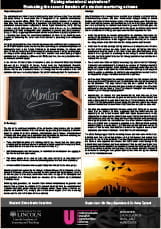by Elena Gaschino //
 The educational underachievement of working-class boys has been the focus of public and policy anxiety in recent years and is recognised as an important contemporary challenge for schools (Rolfe 2015). Within this narrative, white working-class boys are identified as being most at risk of educational underachievement (Equality and Human Rights Commission 2015). However, this narrative overlooks the fact that nationally, students from other heritages and BAME backgrounds, have lower GCSE attainment than ‘White British’ students (Gov.UK 2018). What links underachievement in secondary education is social class, which is commonly measured by the receipt of Pupil Premium.
The educational underachievement of working-class boys has been the focus of public and policy anxiety in recent years and is recognised as an important contemporary challenge for schools (Rolfe 2015). Within this narrative, white working-class boys are identified as being most at risk of educational underachievement (Equality and Human Rights Commission 2015). However, this narrative overlooks the fact that nationally, students from other heritages and BAME backgrounds, have lower GCSE attainment than ‘White British’ students (Gov.UK 2018). What links underachievement in secondary education is social class, which is commonly measured by the receipt of Pupil Premium.
Despite the discourse of failing schools highlighted by league tables (Tomlinson 2019), existing research suggests that schools have less influence over the educational performance of students as compared to families and friends (Burgess 2014). Bourdieu (1977 and 1985) argues that this is because of the social and cultural capital one accrues through these connections. Here, social capital refers to the resources we gain from belonging to a network of people. Cultural capital refers to non-financial social assets, such as knowledge, skills and education that can be used to promote social mobility. Bourdieu also argues that both forms of capital are important factors in educational achievement.
Savage (2014, cited in Wilson et al., 2018) also suggests that individuals establish most of their connections within their social class. Young people from working-class backgrounds are less likely to have access to the professional networks available to their middle-class counterparts. This has the potential to limit their understanding of professional and career progression as well as their knowledge of higher education and its application processes. Mentoring schemes that use undergraduate students enable young working-class people to widen their networks and understanding of higher education (Wilson et al., 2018) and, thus, have potential to develop their social and cultural capital.
It was in this context that the student-mentoring scheme was established and implemented with the key aim of promoting the educational success and aspirations of working-class boys. Having carried out the first evaluation of the student-mentoring scheme in the summer of 2018, I was well placed to continue evaluating this project. Not only did it provide me with an opportunity to consolidate the knowledge and skills gained during the first evaluation, but it also gave me the opportunity for further learning which will support my ambition to study at postgraduate level. It also allowed me to independently manage a research project from start to finish and to gain a new set of skills which will further develop my competencies as a student and future academic.
Despite having experience in undergraduate research and support and guidance from my supervisors Gary Saunders and Dr Anna Tarrant, this evaluation was not without its challenges. I had hoped I would be able to determine whether the recommendations made in the first evaluation had been of benefit to the school and the boys taking part in the scheme, but it became apparent that the project itself had been fundamentally changed during its second iteration and that only a few of our recommendations had been implemented. Nevertheless, it was clear from the interviews carried out with the student mentors, the teaching staff and the mentees themselves that the scheme had benefitted the boys taking part and had been well received by the teachers and school in general. It had also given the mentors an opportunity to gain new skills which will support them in their future careers and a chance to share their knowledge and experience with their respective mentees.
Taking part in this evaluation has been of great value to me. I was once again able to work closely with experienced researchers and benefit from their knowledge as well as gaining further understanding of societal issues and social barriers affecting working-class boys and their educational aspiration. Challenges are a part of research, and I am glad my research team and I were able to face and resolve them as it has helped me grow in confidence whilst preparing me for any future research opportunities.
*To view Elena’s project poster, please click on the thumbnail below:
